by Lisa Cooke | May 23, 2019 | 01 What's New, Genealogy Gems Podcast |
with Lisa Louise Cooke
May 2019
Listen now, click player below:
Download the episode (mp3)
In this episode:
- Two listeners shares an exciting find using Lisa’s research strategies
- Lisa provides next steps on German research in response to a listener question
- Your Master Family Tree, and Sharing Branches Online Explained
- The unusual history of one of the earliest forms of the World Wide Web
NEWS:
Lisa Louise Cooke is back in the studio after two weeks on the road speaking at the Ohio Genealogical Society (OGS) Conference and the National Genealogical Society (NGS) Conference.
Each conference was great and had its own unique feel, and there were many new genealogists in attendance.
Genealogy Gems listener Carol stopped by and enthusiastically shared with how the eBay search strategies for family history that Lisa discussed in episode 140 paid off in a big way!


MAILBOX:

Robin wrote in to share how Sydney Orton’s song with her grandpa in Genealogy Gems Podcast episode 228 brought her to tears in a toll plaza while driving!
Steve wrote in to rave about the value that his new Genealogy Gems Premium eLearning membership has brought to his family history research.
Rylee says she’s grateful to have found the podcast and she shares a story of genealogical discovery that she hopes will inspire others. Rylee asks “How do I find sources for these people? I have searched all over ancestry and Family Search and have had no luck again. I really want to believe that the people I have as Adam’s parents and siblings all the way through his 2nd great-grandparents (paternal) are truly his family but I need to get more information. Where can I go for help with German records and where can I continue my search?”
Lisa’s comments: You’re absolutely right, what you found are just hints. It sounds like it’s time for you to move on from the “Genealogy Giants” (Ancestry, FamilySearch, etc.) and into German records websites, libraries, and archives to find real sources that nail down the family tree.
Lisa recommends the Genealogy Giants quick reference comparison guide.
We have several articles and episodes at Genealogy Gems that can help you do this:
- Go to genealogygems.com
- At the top of the home page select “German” from the “Start Learning” drop down menu
- That will take you to these results pages featuring our German research strategies.
I’m optimistic for you because Germans are known for keeping excellent records, and I have had good luck in searching them.
GEM: Your Master Family Tree, and Sharing Branches Online Explained

I describe it this way: Plant your tree in your own backyard and share branches online.
A master family tree has three important characteristics:
- It is owned and controlled by you.
- It is the final say on what you currently know about your family tree.
- It is protected with online backup to ensure it is safe.
Plant Your Master Family Tree
Lisa uses RootsMagic software for her master family tree. Learn more about GEDCOM files in this article: GEDCOM File (What is It & How to Use This Genealogy File)
Protech Your Master Family Tree
Lisa uses Backblaze to back up her master family tree and computer. Visit www.backblaze.com/lisa
(Using this link also helps keep this free podcast free. Thank you!)
Read more: How to Download Backblaze in 4 Easy Steps

Share Branches Online
Genealogy Giants Guide available in the Genealogy Gems store.

Read Lisa’s article: Planting Your Master Genealogy Family Tree for all of the strategies mentioned in this episode.
The free podcast is sponsored by:
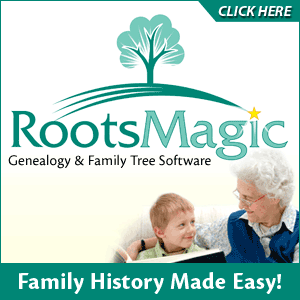

PROFILE AMERICA: Friday, May 24th, 2019
In a way, today marks the 175th birthday of the World Wide Web. Only it was electro-mechanical, not digital. On this date in 1844, Samuel F.B. Morse activated the first telegraph line, sending a dots-and-dashes code message from the U.S. Capitol building to a receiver in Baltimore.
By the late 1850s, the first telegraph cable had been laid across the Atlantic Ocean, and in 1861, the telegraph spanned the continental United States. Over the ensuing decades, the wires wrapped around the world.
From the 1844 demonstration, telecommunications today has grown into a half-trillion dollar a year industry, and employs more than 1 million workers in over 59,000 industry establishments.
You can find more facts about America from the U.S. Census Bureau online at www.census.gov.
Sources:
Joseph Nathan Kane, Kane’s Famous First Facts, Fifth Edition, H.W. Wilson Co., New York, NY, 1997, #7692.
Become a Genealogy Gems Premium eLearning Member
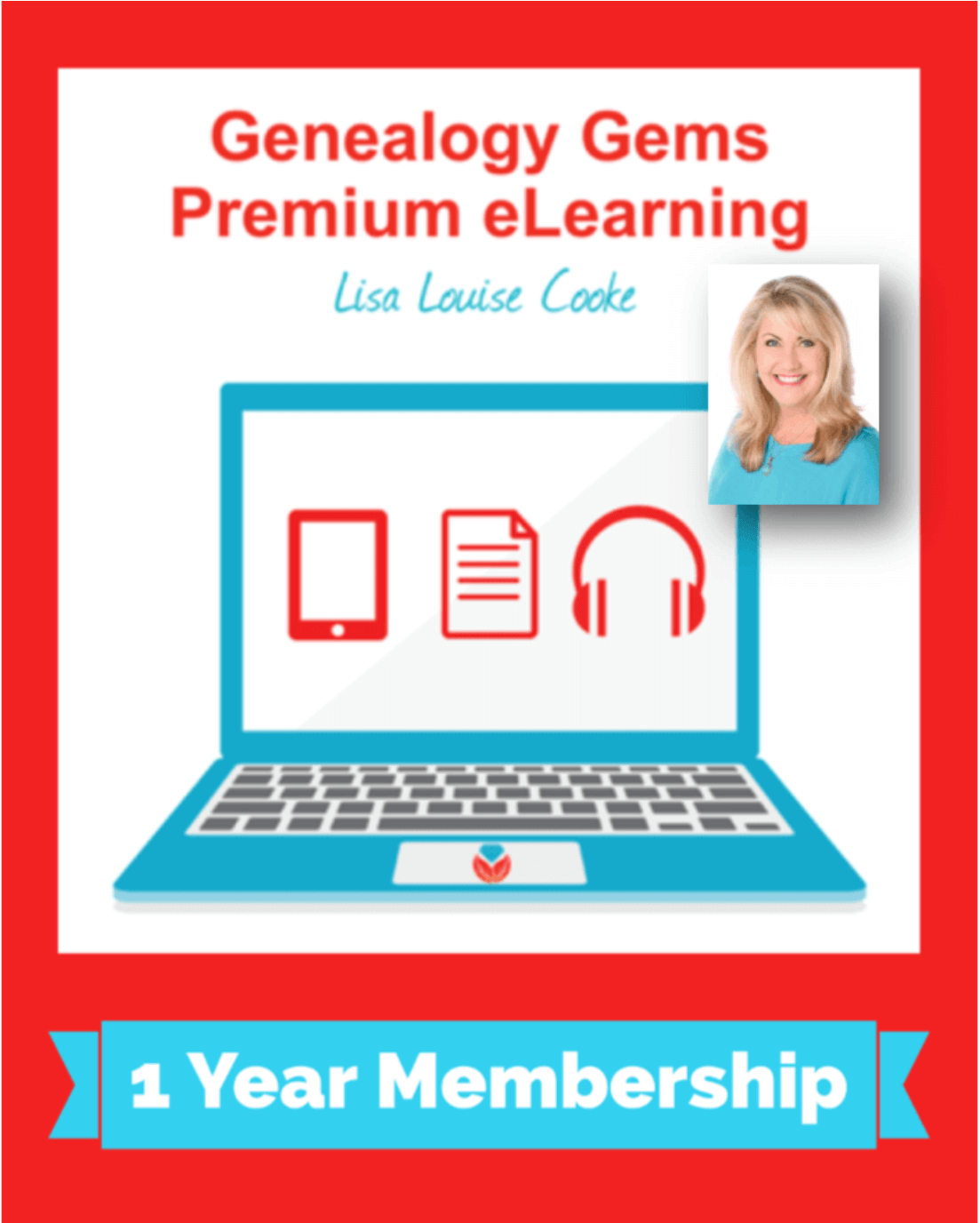
Gain access to the complete Premium Podcast archive of over 150 episodes and more than 50 video webinars, including Lisa Louise Cooke’s newest video The Big Picture in Little Details.
Learn more here.
(Membership doesn’t auto-renew because we don’t like that either. Prior to your membership expiring you’ll receive a friendly reminder email from us.)
Genealogy Gems App Users
Don’t miss the bonus content in this episode. Tap the “gift” icon on the episode screen in the app.
Get the app here or search for “Genealogy Gems” in your device’s app store.
Download the Show Notes PDF in the Genealogy Gems Podcast app.
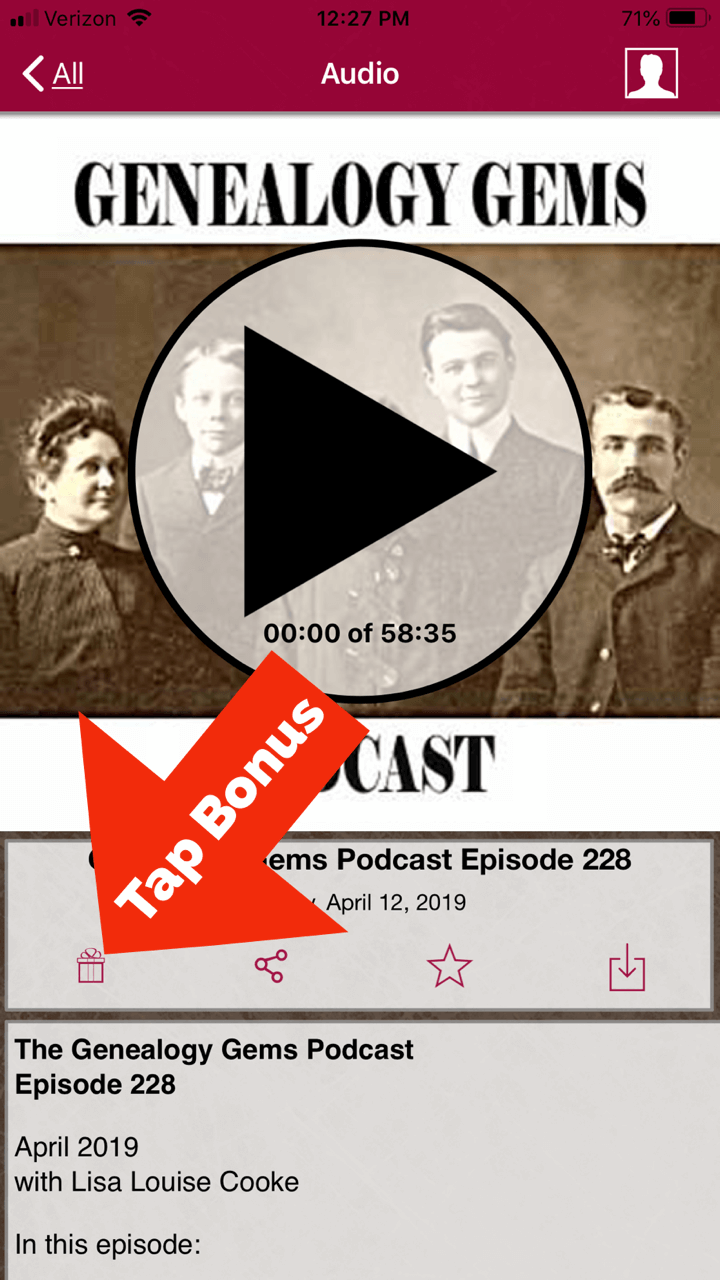
by Lisa Cooke | Jun 24, 2014 | 01 What's New, Family History Podcast, Listeners & Readers
Family History: Genealogy Made Easy Podcast
with Lisa Louise Cooke
Republished June 24, 2014
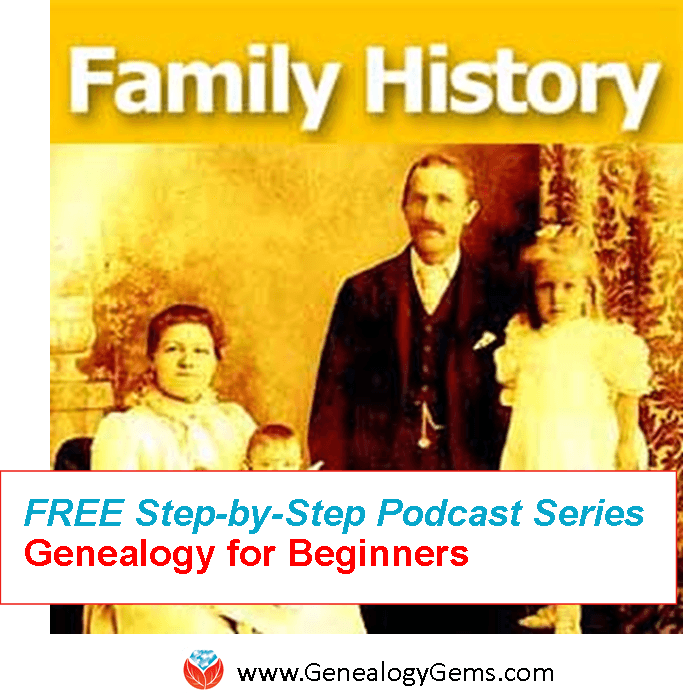
Listen to the Family History: Genealogy Made Easy podcast by Lisa Louise Cooke. It’s a great series for learning the research ropes and well as refreshing your skills.
https://lisalouisecooke.com/familyhistorypodcast/audio/fh37.mp3
Download the Show Notes for this Episode
Welcome to this step-by-step series for beginning genealogists—and more experienced ones who want to brush up or learn something new. I first ran this series in 2008-09. So many people have asked about it, I’m bringing it back in weekly segments.
Episode 37: Your Genealogy Questions Answered, Part 2
Today’s show is all about YOU! Just like Episode 36, this episode is made up completely of your emailed questions, comments and stories. Joining me on today’s episode to read your emails again is my daughter, Lacey Cooke.
Question: Is there a way to get iTunes to download all of the podcasts instead of just the most recent ones? I thought I saw it on the website somewhere but now I can’t find it. –Melanie Armstrong
Answer: (updated since the podcast originally aired): In your iTunes LIBRARY, on the line where the Genealogy Gems Podcast is listed click the GET ALL button. This will download all the past episodes to iTunes on your computer, to be listened to at your convenience. Downloading will take several minutes. You will see a little spinning orange circle to the left of the podcast name as it downloads. Once the episode is downloaded the text will turn from gray to black. Double click the episode and it will start to play after a moment or two.
Question: I use the free forms at Family Tree Magazine’s website. Do you keep your old Family Group Sheets on file so you can double check them later? – R. Butler
Answer: I love all those free forms at Family Tree Magazine! I’ll tell you the truth, I decided to throw mine away. I transcribed everything into my database and threw away the paper. Everything is properly sourced there, which is key. I avoid duplicating efforts, which has happened to me when looking back at old paper forms. If I need to double-check things, I do it from the actual sources—the birth or death certificate or interview—not from the family group sheet. The only exception is if the group sheet is part of a brick wall case file that I haven’t solved yet. I keep them until the case is solved, and then the cited answers go into the database.
Question: How do you know when records/indices are complete? I have been looking for immigration records for my family and cannot find them.
They came in large family groups, so you would think it would be easy to find. Even though the name (Mauge) is often misspelled (Mange, Mauga) I cannot find them at Ellis Island, Steve Morse’s website, The National Archives or through my Ancestry.com subscription. The years span 1880 through 1885. Are these immigration records complete or am I looking in the wrong place? -Anne-Marie Eischen
Answer: There are many factors involved here, and many avenues to pursue. Based on other information you told me about your family’s arrival, here are some ideas:
- The Family History Library has microfilm of the Baltimore Passenger lists between 1920 and 1897 – and it lists the main author as the U.S. Dept of the Treasury, Bureau of Customs. Passengers are indexed by soundex and the soundex code for Mauge would be M200. But considering the variations you have found of the name you’ll want to arm yourself with the soundex codes for all those variations. The M200 names are on Film # 417302 which I found in the Family History Library catalog and familysearch.org and you can just go to your closes Family History Center and order the film for under $10 and they will send it to you to view at the center.
- Check the at the Immigrant’s Ships Transcribers Guild website.
- Click here for a great summary of Baltimore passenger lists by Joe Beine online.
- You will also find an index for Baltimore passenger lists between 1820 and 1897 at the Allen County Public Library in Fort Wayne, IN.
- Look closely at your source for the port information, and see if you can locate any other verification of that. Maybe she actually arrived through another port.
- Usually I would tell you to check departure lists, but in this case, departure lists for Bremen for that time period are not available.
- Here’s a great book recommendation for you: Finding Your Chicago Ancestors by Grace DeMelle.
Question: I wanted to share the results of my Google Alerts. My father had red hair and was called “Red” most of his life. So when I ask for “Red” Browning in my alerts, I have received information on the red Browning sweater (the Browning clothing line), a red Browning rifle case (they make guns) and recently the Cincinnati Reds Tom Browning went to jail (the Red’s Browning…). Alas, nothing yet on my Dad! Another family name is Gorry – you can imagine what I got last Halloween! I do love the alerts though – and have added eBay alerts too, thanks to you. Keep encouraging us and thanks for the great tips! -Joan Ketterman
Answer: I’m not sure how much I can help with that one – keep playing with the “plus” and “minus” signs in your searches to refine what you’re looking for. And I’m glad you’re using those eBay alerts. Learn more about eBay alerts in Genealogy Gems Podcast Episode 140. Note: Genealogy Gems Premium Members can learn more about Google Alerts in Premium Podcast Episode 28.
Comment: On the podcast you recommended using Google Books. I have a “gem” for you….I have a link where the LDS church has archived loads of family history books: http://www.familyhistoryarchive.byu.edu. Follow the link and type in the surname of your choice. I have found some wonderful stories there about my ancestors. – Susan in West Palm Beach Florida
Note: The BYU Family History Archive she references has migrated into the Family History (Digital) Books collection at FamilySearch along with the digital book collections of other repositories/ They are now searchable at FamilySearch.org.
Question: This is just something that bugs me. WHICH is the correct pronunciation of Genealogy??? GEEN-e-alogy (with a long “e” at the beginning) or Gen-e-ology (with a short “e” at the beginning)?
Answer: I’ve heard it both ways and I’ve pronounced it both ways. But when I went to Dictionary.com, they actually have an audio pronunciation and they say, GEEN-e-alogy, with a long “e” at the beginning. However you pronounce it, it’s a barrel of fun!
Question: How can I learn more about the Freedom of Information Act?
Answer: Listen to Genealogy Gems Podcast Episode 20 and Episode 21. It’s also covered in my book Genealogy Gems Ultimate Research Strategies.
Question: Hello, I just finished listening to the June Family Tree Magazine Podcast. I have been wanting to write to you for months now to ask you this question: Who is the musician playing the guitar music during the podcast? My husband is a big Chet Atkins fan and I thought it could be Chet but my husband says no just from listening to it. Can you please provide me with the musicians name? -Melissa Roberge
Listen to this episode to find out the answer!
by Lisa Cooke | Jul 7, 2015 | 01 What's New, Australian, British, Canadian, Findmypast, Irish, Libraries, Records & databases, United States
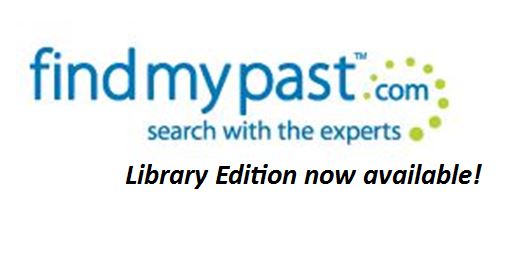 findmypast now has a Library Edition available within the United States. Patrons of subscribing libraries can now have access to their billions of records from England, Ireland, Wales, Scotland, Australia, New Zealand, Canada and the United States.
findmypast now has a Library Edition available within the United States. Patrons of subscribing libraries can now have access to their billions of records from England, Ireland, Wales, Scotland, Australia, New Zealand, Canada and the United States.
Highlights of what you’ll find on findmypast Library Edition include:
- Largest online collection of U.K. parish records;
- Exclusive access to the new PERiodical Source Index (now with images);
- Most comprehensive Irish family history records in the world.
Findmypast’s version of PERSI, the Periodical Source Index, includes more than 2.5 million indexed entries from thousands of genealogical and local history publications–AND a growing number of digitized articles! Click here to read more about PERSI, which we love.
Here’s How You Can Use FindMyPast for Free
We asked Josh Taylor at FMP how subscribers and non-subscribers can use the Library Edition:
1) “FMP subscribers can login to their own accounts while at the library.”
2) “Also, library users who are not paid subscribers can create a free account that allows them to create a tree, store, and attach records they view while at the library. The free account works like a standard Findmypast account so can be used at home to access their tree (and even get automatic hints).”
We’ve blogged about the Hints feature here at Genealogy Gems.
 Ready to do some library research? We’ve got more tips for you, like:
Ready to do some library research? We’ve got more tips for you, like:
Finally, here’s an important tip: let your voice be heard at your public library! They need to know how many people care about genealogy and family history. They need to know what databases you’re most interested in accessing. In an era of struggle for many public libraries, they have to prioritize their energies, so tell them what you want to learn!












